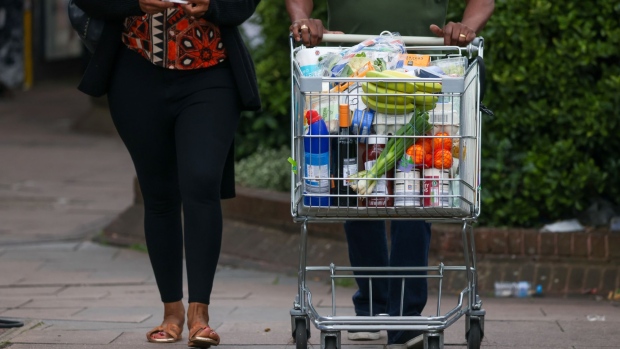Sep 26, 2022
Aldi Says More UK Customers Using Discount Grocer for Full Shop
, Bloomberg News

(Bloomberg) --
Aldi said that more British customers are visiting the discount grocery chain as their first and only supermarket as the higher cost of living weighs on shoppers in the UK.
The grocer attracted 1.5 million extra customers over the past 12 weeks and sales of its gourmet Specially Selected range rose 29% as shoppers switched from more expensive supermarkets, the privately held chain said Monday.
Aldi said it’s committed to keeping prices low even as pretax profit fell more than 80% to £35.7 million ($38 million).
“We will always have the lowest prices in the UK,” Giles Hurley, chief executive officer of Aldi UK and Ireland, said on a call with reporters Monday. “It’s our contract with our customers. It’s unbreakable. We’ll do whatever it takes, no matter what.”
Read more: The Unstoppable Rise of Aldi in Britain Shows No Sign of Slowing
Aldi and fellow German discount chain Lidl are on the ascent as consumers in the UK shop around for cheaper prices on food. Recently, Aldi became Britain’s fourth-largest grocer, displacing Morrisons, according to Kantar data.
Aldi has the largest average basket of all the supermarkets at almost 20 items per visit, equating to about £26, Hurley said.
Cheaper Brands
The retailer is benefiting from a broader trend of shoppers switching from big brands to supermarket own-label goods to save money. More than 90% of Aldi’s sales come from own brand products. Volume sales of Aldi’s Mamia baby brand are up 19% while the overall baby category has fallen 1.3%, Hurley said. Aldi expects the shift from brands to own-label products to accelerate, he said.
Aldi is set to open 16 new stores over the next 12 weeks, including locations at Broadstairs, Luton, Lincoln and New Southgate in London. That’s as part of a £1.3 billion expansion plan that aims to grow the number of Aldi stores in the UK to 1200 by 2025, up from about 970 currently.
Competition on prices is heating up at UK supermarkets as Britons grapple with the highest inflation in decades. Morrisons pledged Monday to cut prices on 150 of its most-purchased products, applying to about 6% of total volume sales. The reductions apply to staples including chicken breasts, bread, baked beans and potatoes. Tesco Plc and J Sainsbury Plc already price match hundreds of products to Aldi.
“We carry a carefully-curated range of around 2,500 products, we have smaller shop floors, we have far lower running costs,” said Hurley. “It’s that very simple and lean, efficient model which means that we can charge the prices we do and are able to deal with inflation more effectively than our competition.”
(Updates with CEO call from fourth graph, Morrisons price reduction in ninth.)
©2022 Bloomberg L.P.


